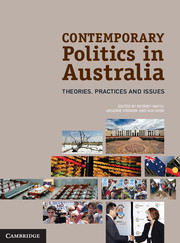Book contents
- Frontmatter
- Contents
- Tables and figures
- Contributors
- Acknowledgements
- Introduction
- I Contemporary Theories of Australian Politics
- Part II Politics in Everyday Australian Life
- Part III Elections
- Introduction to Part III
- 11 Electoral rules
- 12 Political parties as electoral players
- 13 Campaigns and campaign funding
- 14 Voter behaviour
- Part IV Participation and Representation
- Part V Inside the Australian State
- Part VI Contemporary Public Controversies
- Glossary
- References
- Index
- References
12 - Political parties as electoral players
from Part III - Elections
Published online by Cambridge University Press: 05 June 2012
- Frontmatter
- Contents
- Tables and figures
- Contributors
- Acknowledgements
- Introduction
- I Contemporary Theories of Australian Politics
- Part II Politics in Everyday Australian Life
- Part III Elections
- Introduction to Part III
- 11 Electoral rules
- 12 Political parties as electoral players
- 13 Campaigns and campaign funding
- 14 Voter behaviour
- Part IV Participation and Representation
- Part V Inside the Australian State
- Part VI Contemporary Public Controversies
- Glossary
- References
- Index
- References
Summary
Parties are central to the practice of Australian democracy; however, their patterns of competitive behaviour are more closely aligned with some theories of democracy than others (see Chapter 1). Understanding the development and behaviour of political parties within the Australian electoral system is aided by the behaviouralist approach outlined in Chapter 3, which focuses on the creation of general models of political behaviour backed up by empirical evidence. As suggested by the theories in Chapter 2, the institutional rules of elections provide the political context that enables and constrains the ways parties ‘play the game’. The habitual depiction of the Australian party system as essentially a two-party contest would interest discourse theorists (Chapter 5), not least for the idea that the two-party discourse excludes alternative discourses about how Australian politics might be done. Critical theorists would question whether attention to the party contest really obscures the commitment of all political parties to an underlying pattern of inequality (Chapter 4).
- Type
- Chapter
- Information
- Contemporary Politics in AustraliaTheories, Practices and Issues, pp. 132 - 141Publisher: Cambridge University PressPrint publication year: 2012
References
- 2
- Cited by



